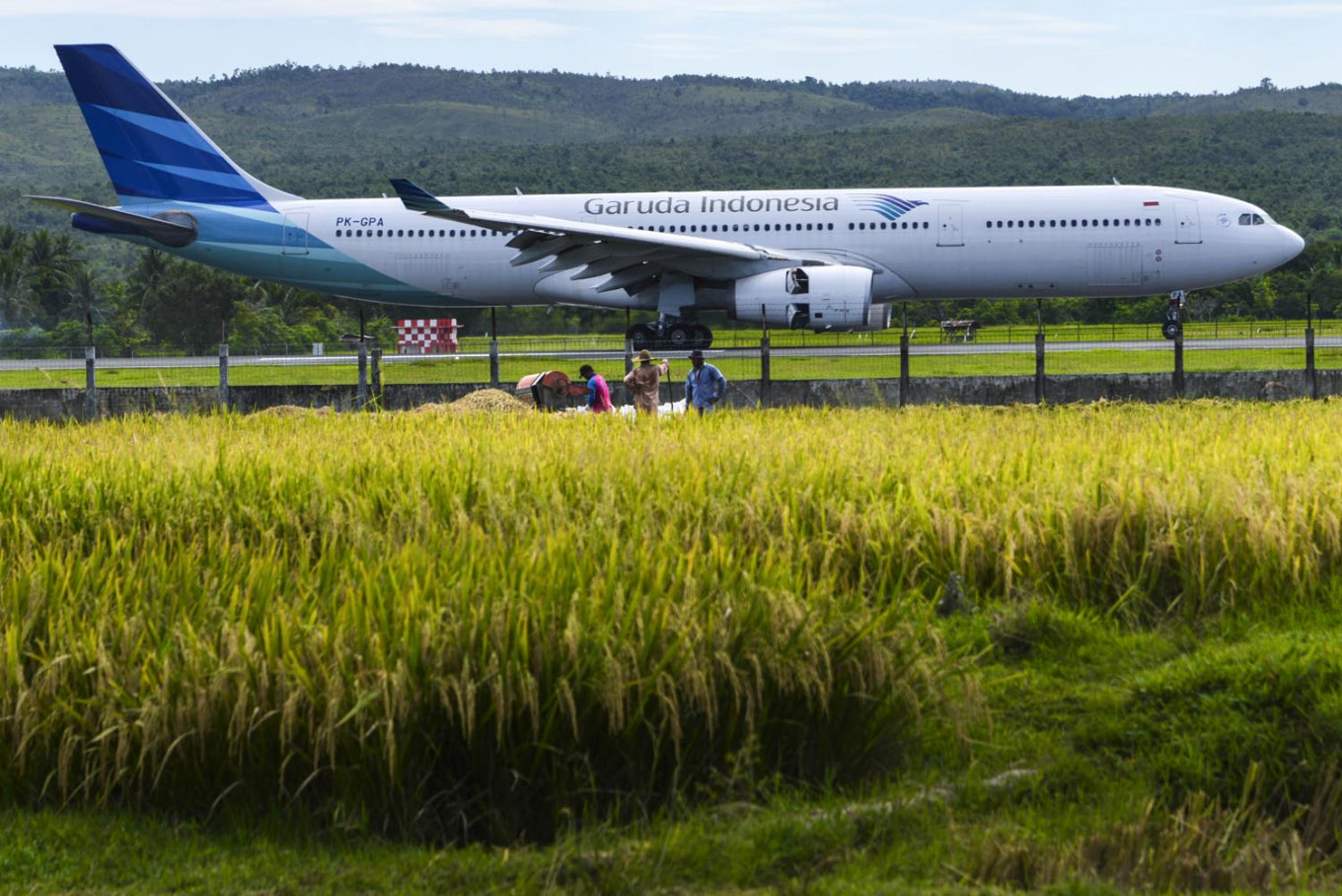Popular Reads
Top Results
Can't find what you're looking for?
View all search resultsPopular Reads
Top Results
Can't find what you're looking for?
View all search resultsGaruda may increase fares as capacity cap hits revenue
Garuda flight traffic has dipped 83 percent year-on-year as of April.
Change text size
Gift Premium Articles
to Anyone
N
ational flag carrier Garuda Indonesia might resort to increasing airfare on account of financial pressure caused by the capped maximum aircraft capacity that has been imposed as part of measures to contain COVID-19.
According to regulation, airlines can only fill half their aircraft capacity for each flight to maintain a physical distance among passengers amid the outbreak.
Such regulation is expected to continue to impact the airline’s already ailing finances if implemented for an extended period, Garuda president director Irfan Setiaputra said on Friday.
“Going forward, physical distancing will still be applied on our flights by leaving the middle seat vacant. However, the problem is that this will impact our finances since not all seats are available to be purchased by passengers,” he said.
“So we will probably appeal to increase our airfare.”
The airline aims for the airfare increase to still be “acceptable” for passengers, Irfan added.
The government’s applied large-scale social restrictions (PSBB) in the country’s regions has decreased demand for air travel and forced airlines to ground their fleets, including Garuda.
Garuda, which has grounded 70 percent of its aircraft, plans to implement cost efficiency measures while aiming to increase revenue from alternative sources, including its ancillary business, the company stated.
Irfan said the airline would also reduce costs by cutting flight frequency on routes with lower demand.
“We will still fly to places to ensure connectivity [across Indonesia]. However, we will reduce the frequency for routes that are not busy to only once a week, for example,” he said.
In doing so, Garuda plans to comply with health protocols on all flights, including by reducing physical interaction on board. It has also suspended the in-flight distribution of newspapers and magazines for passengers and conducts routine disinfection on its aircrafts.
The airline has also switched to using disposable food packaging and water bottles for its in-flight meals to prevent indirect transmission through contaminated surfaces and objects.
Garuda flight traffic dipped 83 percent year-on-year (yoy) as of April, while its number of passengers plummeted by 45 percent yoy in January to April, according to the company’s recent statement.
While it is set to receive Rp 8.5 trillion (US$607.4 million) in working capital guarantee from the government, the airline experienced a 31.9 percent annual drop in passenger and cargo revenue in the first quarter of this year.
To stay afloat amid the crisis, it also recently terminated the contracts of 180 pilots and hundreds of workers.
It has also proposed a three-year extension on its global sukuk worth US$500 million, which were initially due on June 3.
Previously, analyst and the head of research at MNC Sekuritas, Edwin Sebayang, said Garuda must be very careful in maintaining its cash flow and should apply strict cost efficiency measures for the next two years.
Edwin said in the future, Garuda must only focus on profitable routes within the country and across Asia instead of insisting on operating long haul but unprofitable flights such as Jakarta-Amsterdam or Jakarta-London.
“Garuda must change the way it does business. It must put aside its pride and focus on routes that can turn a profit and avoid those that would only incur losses,” he said.
Edwin estimates that in the next two years, the aviation industry will face a tough recovery as passenger demand will slowly return to normal and a decline in revenue is likely to continue.










